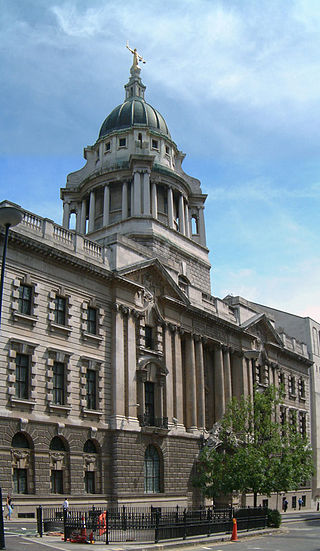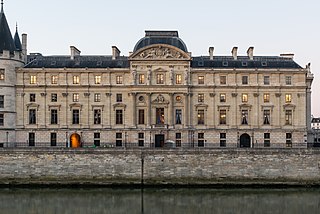
The International Criminal Court is an intergovernmental organization and international tribunal seated in The Hague, Netherlands. It is the first and only permanent international court with jurisdiction to prosecute individuals for the international crimes of genocide, crimes against humanity, war crimes and the crime of aggression. The ICC is distinct from the International Court of Justice, an organ of the United Nations that hears disputes between states.
The following outline is provided as an overview of and introduction to law:

Defamation is a communication that injures a third party's reputation and causes a legally redressable injury. The precise legal definition of defamation varies from country to country. It is not necessarily restricted to making assertions that are falsifiable, and can extend to concepts that are more abstract than reputation – like dignity and honour. In the English-speaking world, the law of defamation traditionally distinguishes between libel and slander. It is treated as a civil wrong, as a criminal offence, or both.

The United States district courts are the trial courts of the U.S. federal judiciary. There is one district court for each federal judicial district. Each district covers one U.S. state or a portion of a state. There is at least one federal courthouse in each district, and many districts have more than one. District court decisions are appealed to the U.S. court of appeals for the circuit in which they reside, except for certain specialized cases that are appealed to the U.S. Court of Appeals for the Federal Circuit or directly to the U.S. Supreme Court.
Civil procedure is the body of law that sets out the rules and regulations along with some standards that courts follow when adjudicating civil lawsuits. These rules govern how a lawsuit or case may be commenced; what kind of service of process is required; the types of pleadings or statements of case, motions or applications, and orders allowed in civil cases; the timing and manner of depositions and discovery or disclosure; the conduct of trials; the process for judgment; the process for post-trial procedures; various available remedies; and how the courts and clerks must function.

The Central Criminal Court of England and Wales, commonly referred to as the Old Bailey after the street on which it stands, is a criminal court building in central London, one of several that house the Crown Court of England and Wales. The street outside follows the route of the ancient wall around the City of London, which was part of the fortification's bailey, hence the metonymic name.

In an extradition, one jurisdiction delivers a person accused or convicted of committing a crime in another jurisdiction, over to the other's law enforcement. It is a cooperative law enforcement procedure between the two jurisdictions and depends on the arrangements made between them. In addition to legal aspects of the process, extradition also involves the physical transfer of custody of the person being extradited to the legal authority of the requesting jurisdiction.
The right to silence is a legal principle which guarantees any individual the right to refuse to answer questions from law enforcement officers or court officials. It is a legal right recognized, explicitly or by convention, in many of the world's legal systems.
An ex post facto law is a law that retroactively changes the legal consequences of actions that were committed, or relationships that existed, before the enactment of the law. In criminal law, it may criminalize actions that were legal when committed; it may aggravate a crime by bringing it into a more severe category than it was in when it was committed; it may change the punishment prescribed for a crime, as by adding new penalties or extending sentences; it may extend the statute of limitations; or it may alter the rules of evidence in order to make conviction for a crime likelier than it would have been when the deed was committed.

A criminal record is a record of a person's criminal convictions history. The information included in a criminal record and the existence of a criminal record varies between countries and even between jurisdictions within a country. In most cases it lists all non-expunged criminal offences and may also include traffic offences such as speeding and drunk driving. In most countries a criminal record is limited to unexpunged and unexpired actual convictions, while in some it can also include arrests, charges dismissed, charges pending and charges of which the individual has been acquitted. The term rap sheet refers to Record of Arrest and Prosecution, similar to a criminal record.

A court of cassation is a high-instance court that exists in some judicial systems. Courts of cassation do not re-examine the facts of a case; they only interpret the relevant law. In this, they are appellate courts of the highest instance. In this way, they differ from systems that have a supreme court that can rule on both the facts of a case and the relevant law. The term derives from the Latin cassare, "to reverse or overturn".
The High Court of Ireland is a court which deals at first instance with the most serious and important civil and criminal cases. When sitting as a criminal court it is called the Central Criminal Court and sits with judge and jury. It also acts as a court of appeal for civil cases in the Circuit Court. It also has the power to determine whether or not a law is constitutional, and of judicial review over acts of the government and other public bodies.

The Audiencia Nacional is a centralised court in Spain with jurisdiction over all of the Spanish territory. It is specialised in a certain scope of delinquency, having original jurisdiction over major crimes such as those committed against the Crown and its members, terrorism, forgery of currency, credit and debit cards and checks, some trade crimes committed in more than one region and over drug trafficking, food frauds and medical frauds committed in a nationwide level as well as over international crimes which come under the competence of Spanish courts.. It has also appellate jurisdiction over the cases of the Criminal Chamber of the National Court.

The Supreme Court of the Russian Federation is a court within the judiciary of Russia and the court of last resort in Russian administrative law, civil law and criminal law cases. It also supervises the work of lower courts. Its predecessor is the Supreme Court of the Soviet Union.
The federal government of Iraq is defined under the current Constitution, approved in 2005, as an Islamic, democratic, federal parliamentary republic. The federal government is composed of the executive, legislative, and judicial branches, as well as numerous independent commissions.

Pre-trial detention, also known as jail, preventive detention, provisional detention, or remand, is the process of detaining a person until their trial after they have been arrested and charged with an offence. A person who is on remand is held in a prison or detention centre or held under house arrest. Varying terminology is used, but "remand" is generally used in common law jurisdictions and "preventive detention" elsewhere. However, in the United States, "remand" is rare except in official documents and "jail" is instead the main terminology. Detention before charge is commonly referred to as custody and continued detention after conviction is referred to as imprisonment.

The North Korean judicial system is based on the Soviet model. It includes the Central Court of the Democratic People's Republic of Korea, Provincial and special-city level Courts, local People's Courts, and Special Courts.

A magistrates' court is a lower court where, in several jurisdictions, all criminal proceedings start. Also some civil matters may be dealt with here, such as family proceedings.
The Judge Advocate General's Corps, also known as JAG or JAG Corps, is the military justice branch or specialty of the United States Air Force, Army, Coast Guard, Marine Corps, and Navy. Officers serving in the JAG Corps are typically called judge advocates.
The judiciary of Iraq is a branch of the government of Iraq that interprets and applies the laws of Iraq, to ensure equal justice under law, and provides a mechanism for dispute resolution. The judiciary is composed of the Higher Judicial Council, the Supreme Court, the Court of Cassation, the Public Prosecution Department, the Judiciary Oversight Commission, the Supreme Iraqi Criminal Tribunal, the Central Criminal Court and other courts that are regulated by law.











